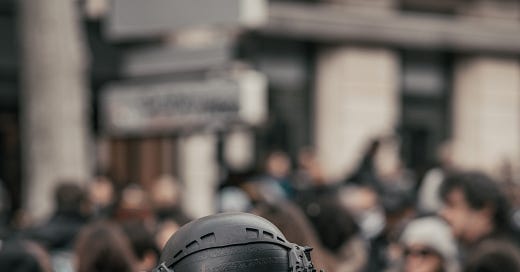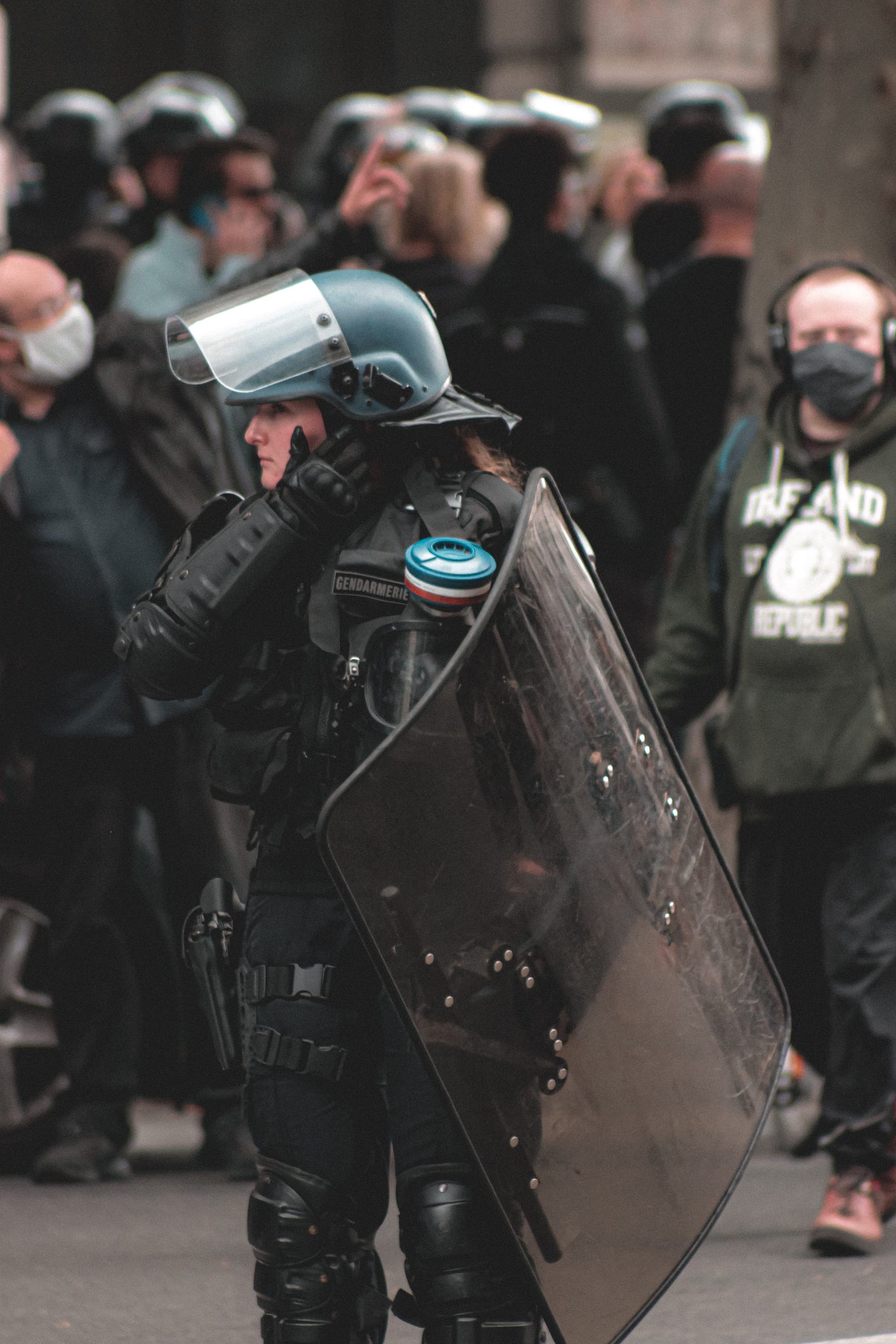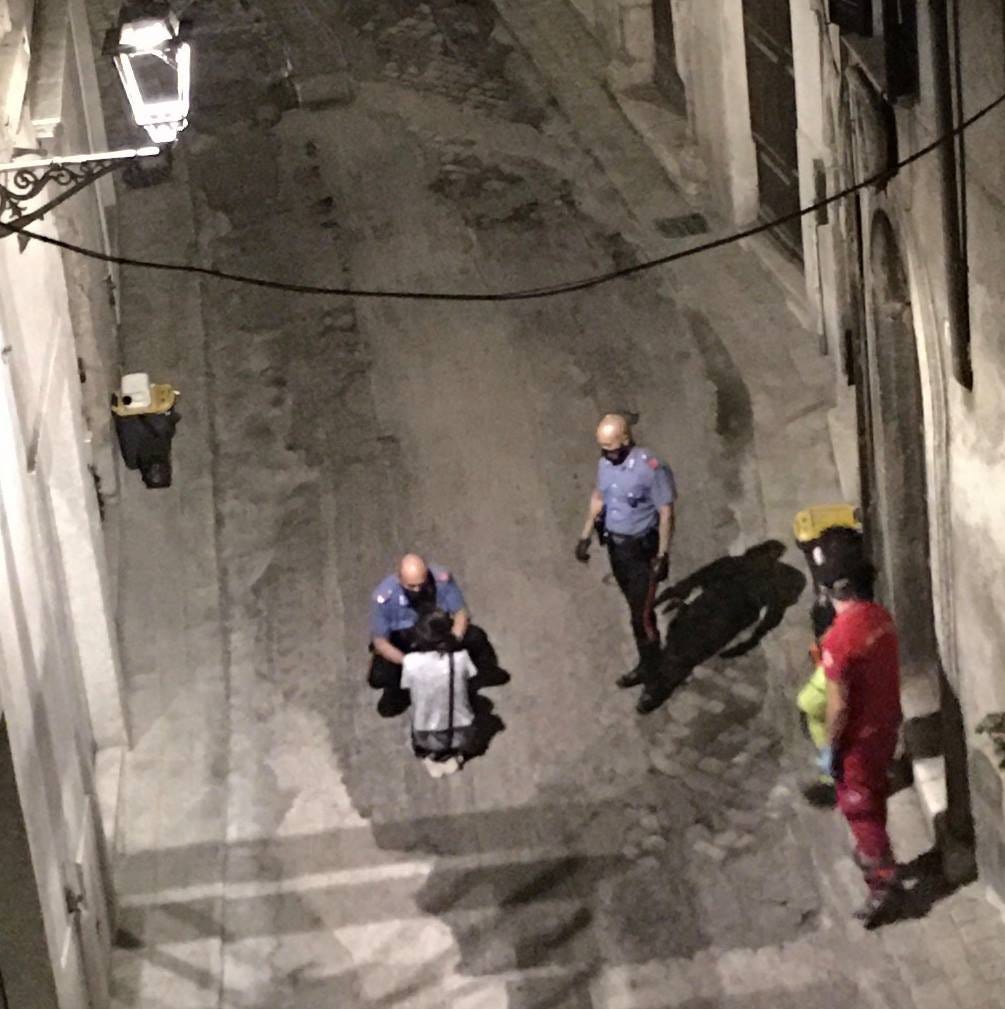This will be a difficult—and potentially fraught—article to write. I’ve been putting it off for a while, and for perfectly good reasons. One, I prefer to keep things on the lemonade side of life here at Cappuccino. Two, I have a visceral loathing of all brute-force authority, including cops. Three, all my love and empathy and support belongs to people of color, especially those who’ve been victimized by law enforcement. Four, it’s a weighty subject, and one that I feel ill-qualified to discuss.
Then an IFM (Immediate Family Member) became a cop.
This decision wasn’t anything I encouraged or discouraged. His life is not mine to live. I gave it to him to live. And I have to remind myself of that every time he tells me stories about apprehending armed suspects or when reading tragic news items like the one about Houston sheriff’s deputy, Sandeep Dhaliwal, the first Sikh to join the force, being shot and killed during a routine traffic stop.
But as I listened to my IFM recount robberies, murders, dangerous drug labs in residential neighborhoods, street gangs, rapes, dismemberments, and countless instances of spousal abuse, against my will, against my very belief system and the extremely entrenched views I held about law enforcement, I began to see cops as people. Ordinary people tasked to see some pretty horrific things, much like a Facebook monitor grinding through images of child sexual abuse night after night, only with cops, there’s a greater likelihood of dying.
I call him “the Trashman,” my IFM whom I love more than my own life. That’s because he is. Every night, he sweeps up the flotsam and jetsam, the mess left by the unspeakable cruelty of man’s inhumanity to man, and then he goes home, unhooks his service piece, and tries to forget the things he’s seen.
The job, which he strongly feels he was born to do, comes at a price. There’s the lights/sirens/adrenaline factor, which any ER doctor will tell you is addictive. But the price he pays goes far deeper than that.
The “brothers in blue” tag exists for a reason. These are women and men who have seen things you and I could never conceive of, not in our darkest dreams. It’s the solidarity of Vietnam vets, the unshakable loyalty of soldiers in combat. The seeming callousness of their jokes, the gallows humor itself, is the same thing as whistling past a graveyard. They see death every day, maybe to the point of being a little bit in love with it. Without always or necessarily being racist or sexist, they are capable of saying racist and sexist things. Maybe it’s all bluster and bravado, smack-talk meant to prove they’re not afraid. Or maybe it’s not.
There are psychological hedges you must perform in order to do the work, ways of calming yourself down. When a loved one speaks to them of picayune problems—a server was rude to them at Starbucks, say, or the man at the toll booth forgot to give them their change—it takes all the patience a cop can muster to remember that these things are important to the loved one, even if they aren’t the kind of world-in-peril matters he or she is forced to deal with every day.
It’s why cops protect each other. No amount of legislation is going to change that. They may obey their superiors, but their loyalty is to their own. Cops are a gang, just like street hoods, only better organized, in uniform, and on the other side of the law. They think like gang members. Men (in particular) are tribal. Cops are tribal, even with others of their kind that work at different precincts.
Cops feel deeply, perhaps irrevocably, separated from the world. Seated at a restaurant with family, their eyes constantly roam, looking for the sudden ambush, the armed robbery, the disgruntled employee. They feel separate and, in a way, dirty, for all their legal and moral high ground. It comes from hauling out the trash night after night, and I don’t use that term pejoratively or against any one kind of person. I mean trash in the sense of refuse, things we don’t want, can’t deal with, have no place for. Things that are icky. Things that might do us harm.
Cops are tragically lonely.
Every cop, on some level, identifies with the same archetype, that of the Wounded Hero. And to be fair, the work they do is, quite often, heroic. “On every scene I roll up to,” my IFM once informed me, “there’s someone who wants to tell me his or her life story.” And they do. Lost, terrified, victimized, these people, at one of the worst moments of their lives, find themselves spilling their deepest thoughts and secrets to the stranger who has come to rescue them. “Most of my job is listening,” my IFM tells me. “The rest is paperwork.”
There are harrowing moments when life or death decisions must be made. The 6’4” mental patient wielding a saber who threatens to kill himself. The depressive who purposely provokes a reaction just to ensure a quick, easy “suicide by cop.” Most civilians don’t realize that a cop is trained to shoot the biggest (and potentially most fatal) area on a human body, namely the torso. Only those inexperienced in law enforcement could naively suggest a cop aim for a leg or a shoulder. During a standoff, maybe. But when the chips are down, no one has time to assess optimal, non-fatal areas. It’s kill or be killed, and it’s never ever pretty or well thought-out.
When body cameras became standard issue for law enforcement, I felt a modicum of relief. I knew my IFM was an exemplary cop. But having video proof of his good conduct could only be an asset in court. My IFM was happy about it, too—with one unusual caveat. “It used to be that cops could exercise discretion in terms of who they took in,” he said. “If a drunk driver was a few blocks from his house, for instance, we could ‘let him make it’ (cop-speak for escorting a suspect home and letting him sleep it off). We can’t do that now. You go by the books, or you can tender your resignation.”
Transitioning from the power-and-adrenaline rush of work to a calmer, more mundane life at home can be challenging. So, too, talking meaningfully of the awful things my IFM has seen. As a young man and as the Wounded Hero, he finds it difficult to ask for help. It’s why many cops, at the end of their shifts, find themselves at a favorite bar, drowning their sorrows with the only people on earth who understand what they’ve been through—even though nobody dares speak of it.
But there are abuses. For every good, decent, law-abiding cop, there’s at least one that has an ax to grind, particularly against people of color. Racial profiling is alive and well in law enforcement, whether it’s openly acknowledged or not. The legal system itself, particularly drug laws, is a table tilted against the Black community. My IFM insists that these days, racist cops eventually wash out or get fired. That may or may not be true of every precinct, but we need law enforcement that protects all citizens, not just white ones.
Let it also be noted that in Italy, which is where I live, cops are trained to de-escalate a situation, not automatically resort to cuffs and guns. Just last week, a mentally ill girl wandered our village, screaming obscenities at the very people that were trying to help. Here is how our local carabinieri successfully calmed her down, by suggesting they kneel on the street together. No hog-tie. Just a conversation. We need more of this kind of policing in the United States.
Over the years, my own run-ins with cops have left me feeling paranoid and hostile. During my work with Occupy, I was arrested during a peaceful protest. On Capitol Hill, I was chained to a police bench for eight hours after turning right on red. In Houston, Texas, coming home late from work one night, I changed lanes at the last minute, turned right on red, and was hauled into the precinct for an additional eight hours. Also in Houston, Texas—and yes, I was turning red, a dangerous thing for me to do, apparently—I was arrested again. The cop didn’t like my flamingly liberal bumper stickers. I also had a ten dollar traffic fine I’d forgotten to pay. That resulted in three days in jail. My kids had no idea where I was. Making a phone call from jail? Five dollars per minute.
The system is rigged, and it’s rigged against those who are least able to fight against it. When I went to go pay that ticket, the court bailiff threw me out because he didn’t like the maxi dress I was wearing. It wasn’t tight. It wasn’t provocative. He just didn’t like it.
That’s abuse of power.
So, how do we, as citizens and lawmakers with no experience in law enforcement, regulate law enforcement? How do we ensure that fewer Black men and women die as a result of police brutality? In what way can we protect the Daunte Wrights, Andre Hills, Rayshard Brooks, and George Floyds of our country? I’m not an expert, but I desperately want this to be a better world for people of color and a safer world for my IFM. A safer world for all of us.
For the record, I’m against defunding the police. We need police—we just need them working for us and not against us.
Here are a few ideas.
Raise the starting pay for all law enforcement. Before you press SEND on that hate mail to my account, please let me explain. Cops, like all public servants, including teachers, especially teachers, are woefully underpaid. If you pay a decent wage, you will have a much bigger pool of candidates to choose from. It’s simple economics. Build it, and they will come. Pay them, and they will apply.
Involve law enforcement in the policing of law enforcement. And I’m not talking about just bringing in the brass. We need rank-and-file cops, the ones that do the actual policing, to have a place at the table. We need to ask for their input and get them personally invested. Cops feel as though the whole world hates them right now. Frankly, it’s not fair. Not all cops are bad, but the good ones rarely make international headlines.
Invent safer, less lethal ways of apprehending suspects. My IFM sent me this alternative to lethal force just today. We’re very clever apes, we humans. If we need non-fatal weapons, we can create non-fatal weapons. This looks like a terrific place to start.
Non-lethal weapons cost money. Training cops to de-escalate dangerous situations costs money. Better kevlar costs money. This is why law enforcement needs a budget increase, not a budget decrease.
Require a four-year degree for all new hires with mandatory classes in sociology, ethnic and gender studies, and criminal science, which is another justification for raising the starting pay for cops. Scholarships and/or tuition reimbursement could be made available.
The toxicity we see in some police departments is a problem that will not be solved by demonizing cops, starving them of money, or tarring and feathering them with a single brush. The better educated your work force, the less likely said work force will fall victim to bigotry and ignorance.
The most important thing to remember is we’re not cops. It’s easy to armchair quarterback when we’re watching a dashcam video, but the truth is, we have no idea what it’s like for them out there. And this is me saying that. Me. A woman who spent her whole life despising law enforcement—with reason.
We have miles to go before we achieve anything resembling a functional, reasonably healthy police force. There’s no time to waste. Raise the bar for hiring cops, pay them an attractive salary, require a four-year degree, and we can change not just the face of law enforcement. We can change the world.
What are your thoughts and constructive criticisms on the state of American law enforcement? Please comment below.
While I have you, not everyone can afford to support Cappuccino by giving a monthly or yearly contribution, but everyone is capable of sharing the articles you read here. Right below this paragraph, you will find a small box with an arrow pointing up. Feel free to click on that icon and use it to share the articles you most enjoy. Thanks for your support.









Hi, in possible solutions you've overlooked the main one:
Gun control.
There are a myriad of places, mostly in nature, I'd love to see in the US.
I have no doubt though that I most likely never will. I simply don't want to be in a society where a large part of the population is insane with their love of guns.
The US needs to spend more money on police and populous for education,
especially on nonviolent conflict resolution.
First cop I ever had a conversation with was an E-6, a Staff-Sergeant, when I was in the army. We became friends in part because we discovered we both loved history and playing Avalon Hill wargames. One day, at of nowhere that I can recall, he looked over at me and said, "I only carry ONE offensive weapon." At which point he pulled out his pen and clicked it several times.
A woman I dated for many years (we're still friends) Brother in Law was one of the top homicide detectives in Chicago. Those folks all dress in cheap clothes (we're talking Ross is a step up for them), not because they want to or can't afford better. Neither of those claims is true. Rather, it is because that BiL had an incinerator in his back yard, and at least once a year his wife would have to burn everything he'd been wearing that day because of the stench.
I once had to deal with a dead body. It was a goat. I had to hoik it into the wheel barrow, then cart it off to the woods behind the barn. A simple run through the washer was enough for my clothes.